With Team USA’s Olympic trials around the corner, 100-meter hurdler Dawn Harper-Nelson has enlisted the help of a new assistant coach – although not the kind you might expect.
Like other coaches, the new recruit will watch closely from the sidelines, shouting instructions as Harper-Nelson, a gold medalist at the 2008 Olympics in Beijing, undertakes sprints and speed drills; the only difference is that this coach also happens to be her one-year-old daughter, who hasn’t entirely grasped what’s going on.
“Having her at the track is hilarious, tiresome and wonderful all in the same,” Harper-Nelson tells CNN Sport.
Whether she’s at the track or in the gym, her daughter, Harper, is often close by.
“It’s funny the things she catches on to,” Harper-Nelson adds. “She’s playing with her toys that we bring out, you’re not realizing how much she’s really absorbing everything around her. She does a countdown: ‘Three, two, one, go!’ And she’ll start running on her own.”
Harper-Nelson, who also won a silver medal at the 2012 Olympics on top of her gold in Beijing, announced her retirement from athletics in 2018, saying at the time that she wanted to start a family.
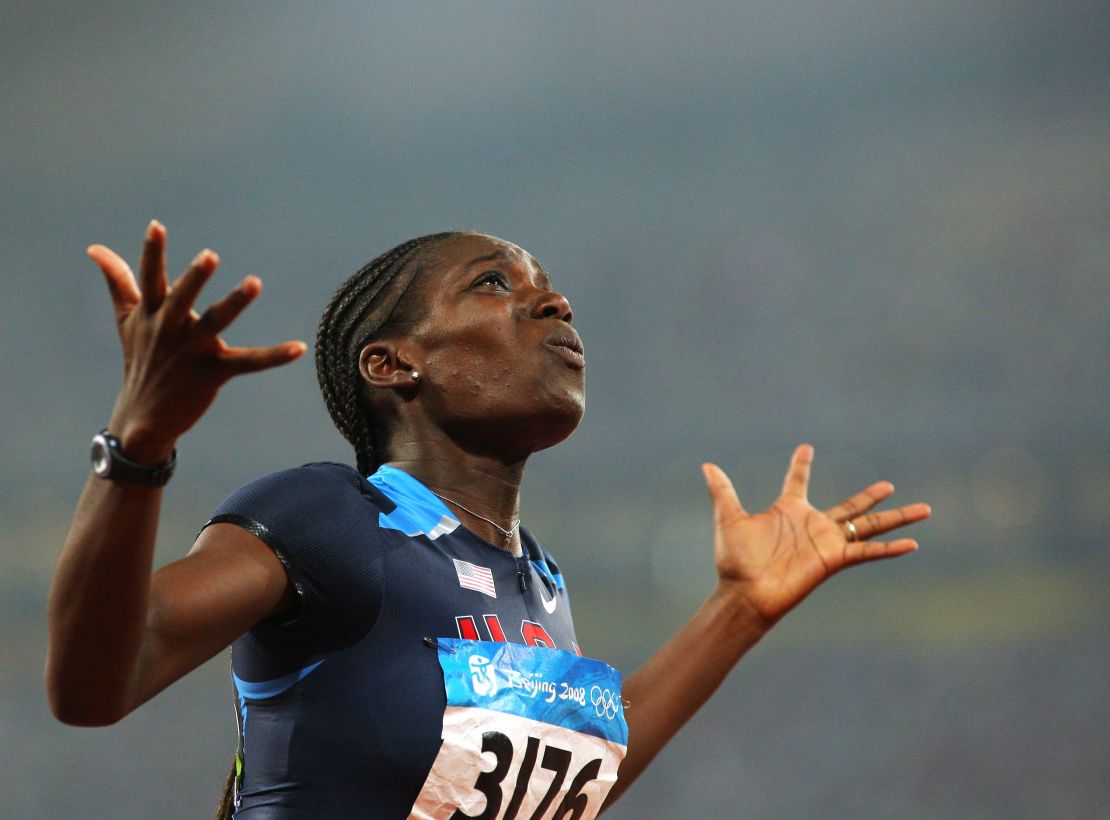
But after stepping away from the sport, the thought of returning kept running through her mind.
“I thought about it constantly – that I still love to compete,” she says. “I felt my body was still capable … and I was thinking: ‘I don’t want my daughter to think that mommy had to give up on her other dreams for me.’”
Early on in her career, Harper-Nelson, 36, admits that her primary focus was always athletics; it never occurred to her that she could be a mom and an athlete at the same time.
“Throughout my career, I feel like there have been other opportunities, like TV things where I turned them down because I’m like: no, my focus is the Olympics, it’s the Olympic year,” she says.
“Now having a daughter, it is more on my plate than any TV show or anything could have added.
“I would have it no other way – I love the stress and pressure that I put on myself … I see her little face and see her smile and I’d do it all again.”
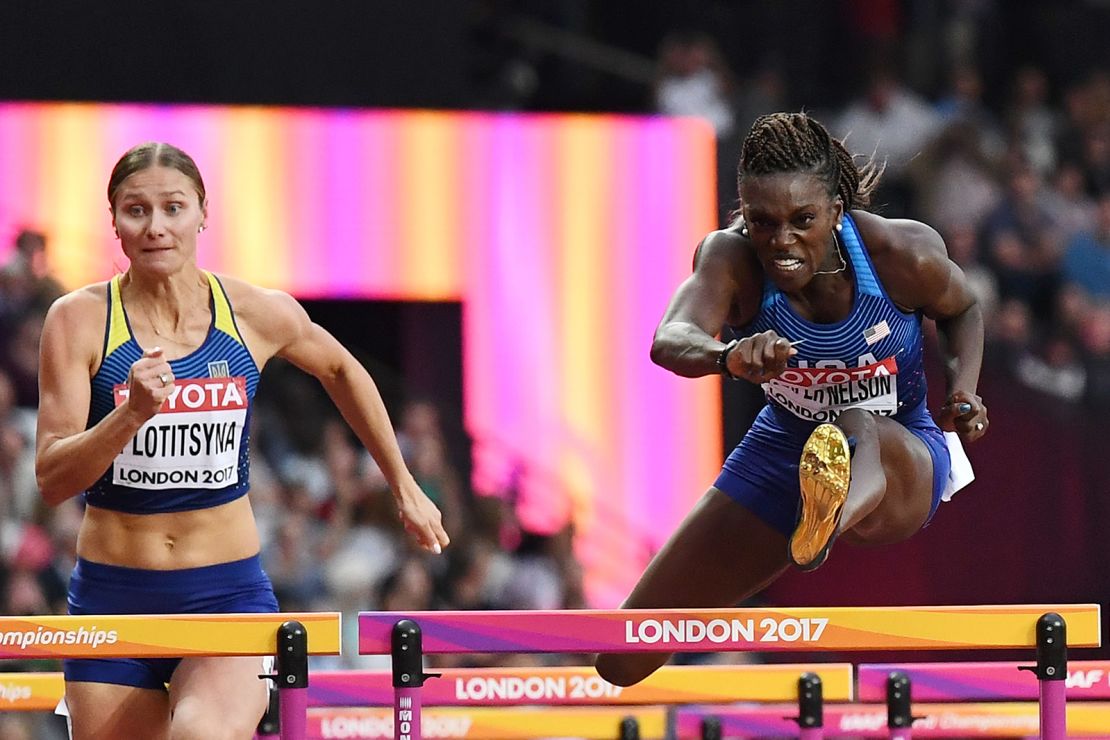
READ: How Sandi Morris and Tyrone Smith navigated the ‘purgatory’ of a postponed Olympics
‘My life, my decision’
As she continues her preparation for the Olympic trials in June, and perhaps also the Olympics in Tokyo a month beyond that, Harper-Nelson hopes to inspire other moms not to give up on their sporting dreams.
She singles out Serena Williams as her own source of inspiration – the 23-time grand slam winner having returned to tennis after the birth of her daughter, Olympia.
In terms of track and field athletes at this year’s Games, Harper-Nelson could have company from fellow moms Allyson Felix, the most decorated athlete in US track and field history aiming to compete at her fifth straight Olympics, and Jamaica’s Shelly-Ann Fraser-Pryce, a two-time Olympic gold medalist in the 100m.
With her return to the hurdles, Harper-Nelson explains how she wants to defy the mindset that says “you don’t have it after you have a child, physically,” and “you just need to accept it, moms. You have a mom bod now.”
“We can do it if we choose,” she says. “It is my life. It is my decision. And so for me, I just feel like this go round (the Olympics) means so much more.”
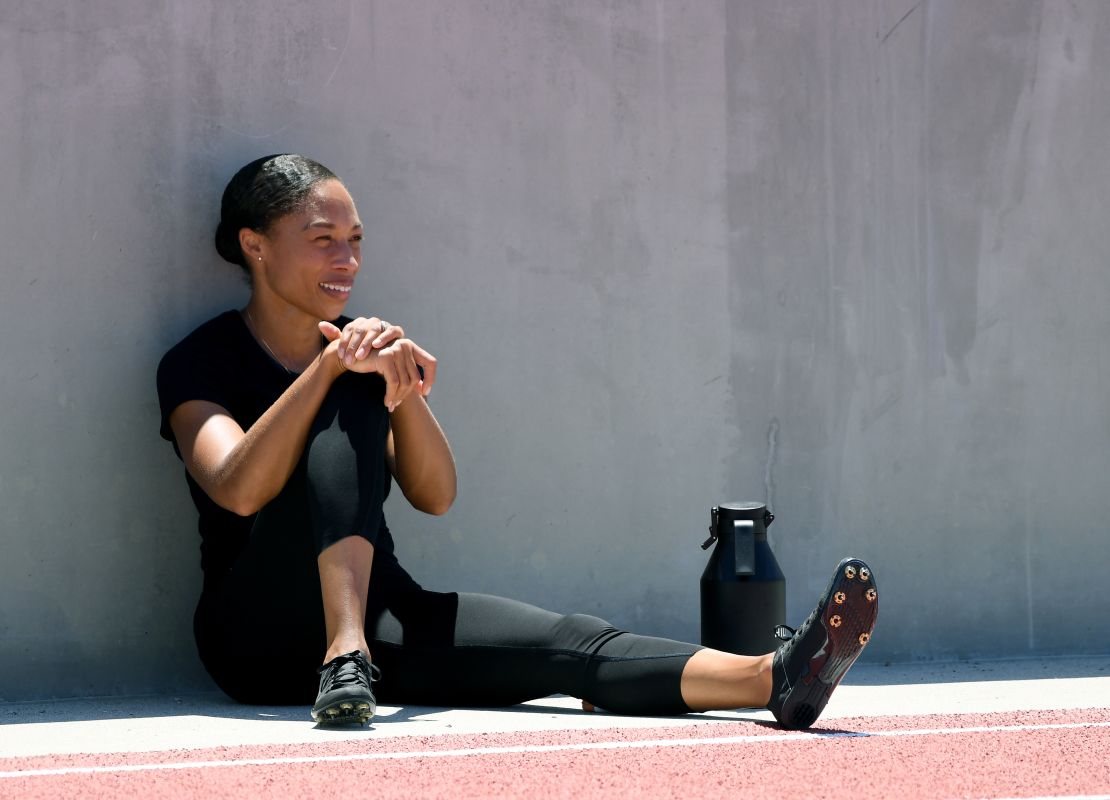
Ahead of Tokyo 2020, Harper-Nelson has received sponsorship from &Mother, a US-based nonprofit organization that seeks to break down barriers that prevent women from being both an athlete and a mom.
&Mother was co-founded by seven-time US national champion and 2012 Olympian Alysia Montaño, who, as well as Felix, has been critical of the way mothers – and aspiring mothers – are treated within the sport.
Montaño told the New York Times in 2019 that Nike had said it would pause her contract if she wanted to have a baby, the fallout from which prompted the apparel company to expand its protection for pregnant athletes to ensure they won’t be “adversely impacted financially for pregnancy” for 18 months, six months longer than its previous policy.
Last month, &Mother announced a partnership with Cadenshae, an activewear company for pregnant and breastfeeding moms that is assisting athletes like Harper-Nelson with training, travel, family support and sportswear as they prepare for the Olympic trials.
“After my awful experiences, I’ve been on a mission to find companies who will back and showcase the ‘whole person,’ not just the athlete,” says Montaño.
“We need other brands, other companies to sponsor female professional athletes for their whole career … not just the times that best serve them.”
‘If I lose or have a bad day, they don’t really care’
Another athlete who has been backed by &Mother in the run-up to Tokyo is Sara Vaughn, an American middle-distance runner competing in the 1500m.
As well as being an elite runner, Vaughn is also a mother of four and a full-time real estate agent based in Boulder County, Colorado; adaptability is a key component of her training schedule.
“I do block out time for my running, I treat it as any other meeting and I try to block out time,” Vaughn tells CNN Sport, adding that her current schedule is a 60/40 split between real estate and running.
“But in our real estate market and just the nature of my job, sometimes things change really quickly, or also the nature of having four kids. Stuff just changes.
“I’m fortunate that my husband is my coach and he usually can foresee those things and make adjustments on the fly. There was a day a couple of weeks ago where I planned a workout at 10 a.m. and actually didn’t get it done until 4:30 that afternoon.”
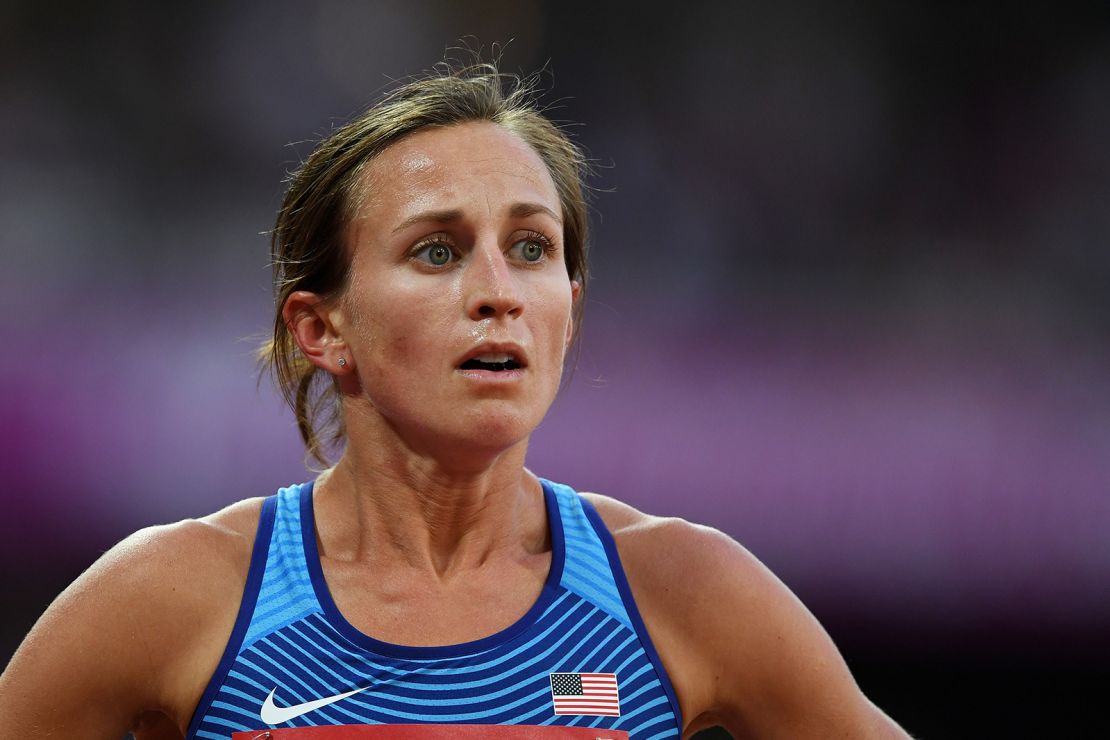
Vaughn, 34, has never experienced the transition of becoming a professional athlete and a mom in the same way as Harper-Nelson. She’s been a good runner as long as she’s been a mom, and throughout her career, Vaughn’s kids have been able to provide a sense of perspective.
“When I walk in the door from a race or a workout, no matter how it went, my kids couldn’t care less if it went great,” she says.
“The only time they really cared is if they get to go on a trip, like when I got to take them to London a couple of years ago for the world champs; that was exciting to them.
“But if I lose or if I have a bad day, they don’t really care about that either. It’s just back into the normal routine.”
Core stability
When Vaughn competed at the 2017 world championships, her third child, Cassidy, was a year old. Four years on, Vaughn is again trying to qualify for Team USA with a one-year-old after the birth of her fourth child, Davey. She knows better than most what it’s like to return to elite sport after childbirth.
“I’ve learned over four pregnancies that each is different,” says Vaughn.
“You just have to really be in tune with your body and what feels comfortable and what you’re ready for. I’ve learned that, this time around, it took me longer to get back into shape – and that’s okay.
“Even if you feel ready for something, your body might not be structurally ready for it … mak(ing) sure my core is stable, my hips are ready, and my muscles are ready to handle sprinting around the track before I actually tackle those workouts.”
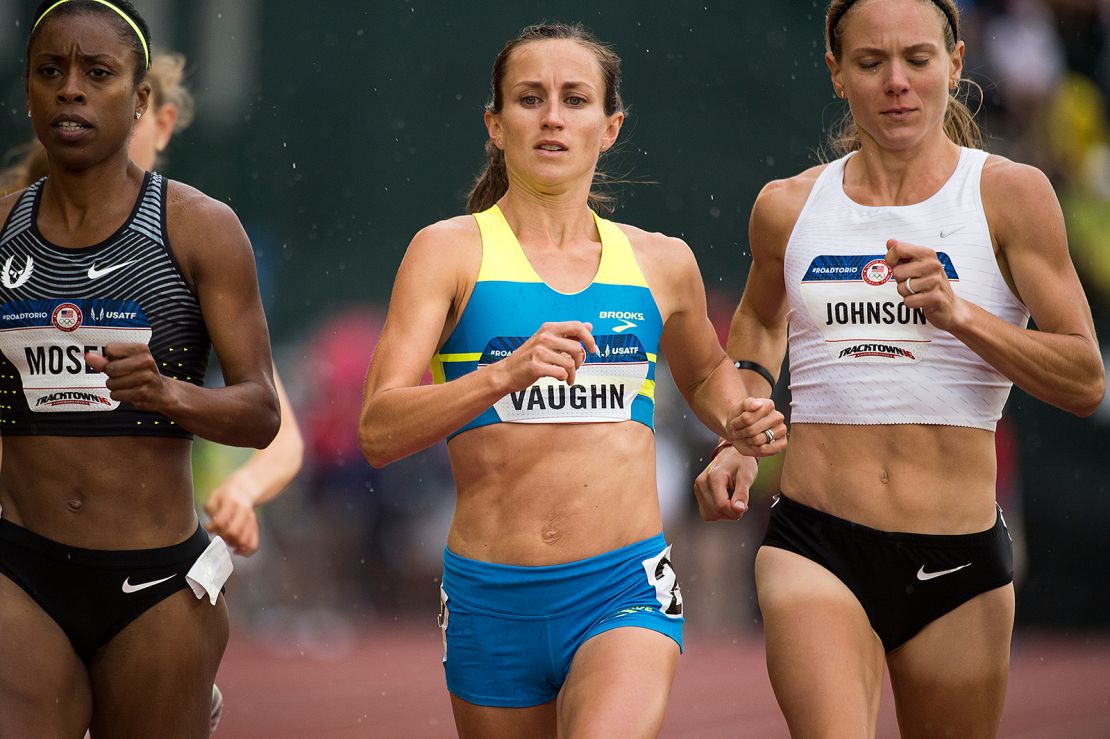
The need to be patient when returning from childbirth is something Harper-Nelson discovered the hard way. As she took off for her first sprint a month and a half after giving birth to her daughter, she recalls how “loose and fluid” her body felt.
“It was such a shock because I am a student of my body and I did not expect that, I had never felt that before. And I started crying. I was like: what is this? I can’t go fast, it’s over,” she says
“That was really an eye-opener to realize my body is different and I need to be a student of this new body.”
Last month, it was announced that no overseas fans would be able to travel to Tokyo for the Games, which begin on July 23.
That means both Harper-Nelson and Vaughn are unlikely to have their children in the stands were they to qualify.
But their journeys could be significant for the millions of people watching at home. The sight of a mother competing at the Olympics would no doubt inspire numerous of other women around the world to dream to do the same.




